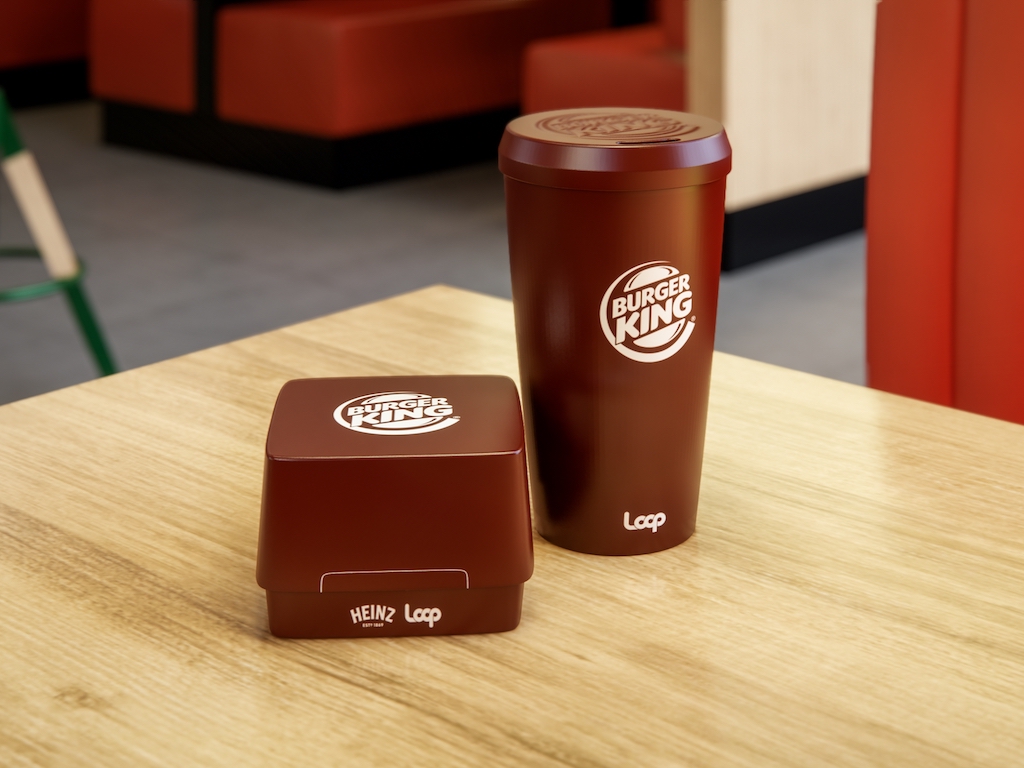3 Mins Read
Burger King has announced a new partnership with circular packaging service startup Loop to pilot reusable packaging for its iconic menu items like the Whopper and drinks. As a part of the trial, customers in select Burger King restaurants in New York City, Portland and Tokyo will be able to choose the zero-waste option for their orders, with more cities to join the program in the future. It comes just after McDonald’s said they will test Loop’s reusable cup model for their hot beverages starting next year, a testament to the pressure that fast food chains are under to tackle the global waste crisis.
Burger King will be launching its first ever closed-loop packaging system in partnership with Loop, the circular packaging and delivery platform owned by TerraCycle. As part of the new multinational trial, customers at select restaurants in New York City, Portland and Tokyo will be among the first to be able to choose to place a deposit to use Loop’s reusable containers, which will later be refunded once the reusable items are returned. The pilot will begin in 2021.
We’re investing in the development of sustainable packaging solutions that will help push the food service industry forward in reducing packaging waste.
Matthew Banton, Head of Innovation & Sustainability at Burger King
The zero-waste cups and container boxes will then be professionally cleaned and sanitised by Loop before they are reused again for the next customer. Burger King says that it expects more cities to be added to the pilot in the coming months, as part of its company-wide pledge to source 100% of its packaging from renewable or recycled sources by 2025.
“As part of our Restaurant Brands for Good plan, we’re investing in the development of sustainable packaging solutions that will help push the food service industry forward in reducing packaging waste,” said Matthew Banton, head of innovation and sustainability at Burger King.
“The Loop system gives us the confidence in a reusable solution that meets our high safety standards, while also offering convenience for our guests on the go.”
The fast food giant added that it will also be collaborating with other food industry titans, such as Kraft-Heinz, who will provide insights and resources to the trial program, though no further details of what this partnership will entail have been released.
With Burger King joining the reusable container bandwagon, following McDonald’s move to also test reusable cups in the U.K. in partnership with Loop in 2021, the impact could be huge in terms of slashing waste. The Whopper maker operates more than 18,800 locations across 100 countries, making it the second biggest fast food burger chain in the world.
During Covid, we have seen the environmental impact of increased takeaway ordering which makes this initiative by Burger King all the more important.
Tom Szaky, Founder & CEO of Loop & TerraCycle
It also comes at an especially crucial time where efforts to curb waste and plastic pollution have stalled amid the coronavirus crisis. Since the pandemic began, there has been a rise of unfounded claims over coronavirus contamination related to reusables, many of which have been promoted by right-wing think tanks and lobbying groups who have exploited the crisis to push against bans on single-use plastics.
However, recent scientific evidence has confirmed that reusables do not raise the risk of coronavirus transmission as long as basic hygiene is employed.
“During Covid, we have seen the environmental impact of increased takeaway ordering which makes this initiative by Burger King all the more important,” said Tom Szaky, founder and CEO of Loop and TerraCycle. “This enables Burger King consumers to easily bring reusability into their daily lives, and whether they choose to eat-in or takeaway, they will be able to get some of their favorite food and drinks in a reusable container.”
Earlier this year in July, the circular e-commerce startup announced its major partnership with Tesco to launch its services across the U.K., which offers customers more than 150 food and household products in refillable containers.
Lead image courtesy of Burger King / Loop.




